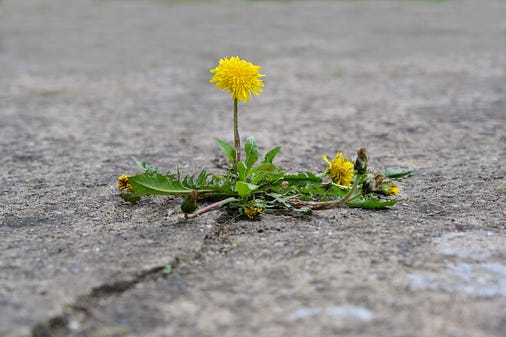Thank you for joining the Steady community. A gentle reminder that paid subscribers help fund our effort, allowing us to produce more content freely available to all.  January 6th Committee @January6thCmte January 6th Committee @January6thCmte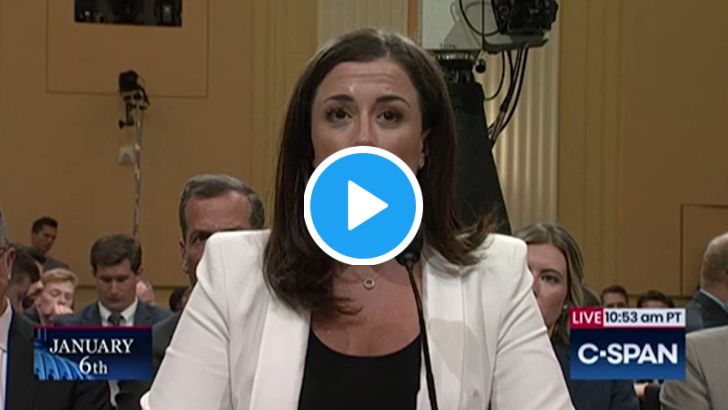 June 28th 2022 3,432 Retweets9,743 LikesI am shaken. And I don't feel like I shake easily. Our nation. The president. A set of facts — damning testimony — that would have been beyond most of our abilities to imagine. But here we are. I have seen a lot over the course of my life, but I have never seen anything like this. I know I have said that a lot recently, but events keep escalating. And it continues, sadly, to be true. This seems surreal. But it's all too real. This happened. What we learned today in the committee hearing is that the president of the United States knowingly fomented, and was eager to lead, an armed mob to attack the U.S. Capitol. The threat of violence was known far in advance. We now have eye and ear witness testimony plus other strong evidence of proof that the threat of bodily harm on a branch of government wasn't an unfortunate byproduct — it was a driving force. Sometimes fate shines a bright spotlight on people who have been far outside the public's consciousness. Before reporters last night identified today's star witness as Cassidy Hutchinson, an aide to White House Chief of Staff Mark Meadows, how many Americans had heard her name? Now she will forever occupy a place of import in American history. There are some who are dismissing Hutchinson's courage. They note that she was a loyal acolyte of the Trump White House. She kept these secrets until compelled under oath to testify. What choice did she have, the argument goes, but to speak? There is some merit to all of this, but I would not dismiss what it means to stand up and tell these truths to a global audience when we have seen such vindictiveness and threats leveraged from the former president and his enablers and henchmen. Hutchinson's story is beginning. We will see where she goes. And let us not overlook how stark her example stands in contrast to the cowardice of all who have remained silent — mostly senior men of privilege and power. There will be time for much more thoughtful analysis to put what we are learning now in real time into greater context. For now, however, we must remember how close we came to never learning the full story. If the Republicans had a majority in the House, there would be no committee. The majority of elected officials in that party are not only eager to sweep this insurrection under the rug, they still pay fealty to the would-be dictator who fomented it. We have had far too much silence. Far too much complicity. Far too many lies. And I have a sickening feeling that we will learn a lot more. I dearly hope we can purge this cancer from our body politic and that all who are responsible feel the full weight of justice. |
Providing accurate and timely information about what matters in Franklin, MA since 2007. * Working in collaboration with Franklin TV and Radio (wfpr.fm) since October 2019 *
Wednesday, June 29, 2022
Dan Rather: Shaken
Monday, June 27, 2022
Celebrate with Pride - 2022 (photo essay)
Hundreds of folks strolled through the Town Common Sunday afternoon, checking out the vendor tents, organizational information available, lingering for the varied open mic, and musical entertainment.
The first Pride day was successful. The next one is already being planned for. Hold the date for June 25, 2023.
 |
| the art wall helped frame this view |
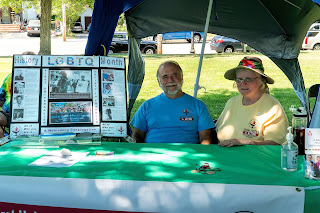 |
| First Universalist Society of Franklin provided info at their tent |
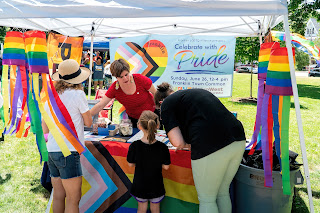 |
| the Franklin LGBTQ+ Alliance tent was centrally located and busy all day |
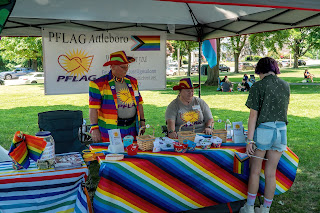 |
| PFLAG Attleboro, just one of many neighboring communities represented |
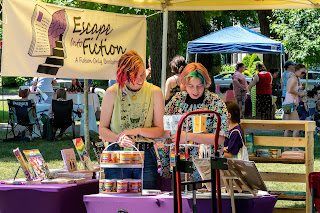 |
| Escape into Fiction was there with books |
 |
| Sioo MC'd the open mic portion and performed a few of her songs |
 |
| group photo L-R yours truly, Melanie Hamblen, Jeff Roy, and Sarah Mabardy |
 |
| Singer Krisanthi Pappas and Bass Player Steve Skop closed out the day with their performance |
Monday, June 13, 2022
Senior Story Hour: Episode 042 - Uvalde, Cribbage, Visiting The Neighborhood, Amazon and More (audio)
"In this episode, the Franklin Senior Center writer's group share stories, poems, writings and more about the tragedy Uvalde, Cribbage and a String of Pearls, Revisiting old neighborhoods, Amazon deliveries and more!
This episode aired on Franklin Radio for June 2022."
Audio file -> https://senior-scribblers.captivate.fm/episode/episode-042-uvalde-cribbage-visiting-the-neighborhood-amazon-and-more
Monday, December 20, 2021
Feeling Vulnerable by Dan Rather and Elliot Kirschner
Thank you for joining Steady. We strive to make this platform and exchange of ideas accessible to anyone who would like to be part of our digital community. A gentle reminder that paid subscribers are greatly appreciated and help fund our effort; allowing us to produce more content free of charge and available to all. Feeling Vulnerable
As another year winds down... As we look to the future... and ponder a perilous time in this nation's history... As we contend with global challenges... ... with our environment... ... our health... ... our systems and notions of justice ...There is no shortage of adjectives to apply to our times - dire, dangerous, and demoralizing, to name a few (and that's just for the letter D). Today, however, we wanted to explore one closer to the end of the alphabet - vulnerable. Perhaps it is another looming wave of Covid, perhaps it is the multiple threats we face to our democracy, perhaps it is a season when we reflect on the past, perhaps it is the feeling of instability that comes with aging, but a feeling of vulnerability has been a major theme in conversations we have been having with family and friends. Vulnerability is part of the human condition, no matter the era. On a personal level, we are all vulnerable and we can see the vulnerability of those around us. Youth provides, to some, a false shield of invincibility, but life often knocks that down pretty quickly. The months I spent bed-ridden with rheumatic fever as a child is a personal reminder I carry with me. When we look back, however, we can likely think of times when the general state of vulnerability in our communities, and the nation and world as a whole, felt far less present than it does today. Perhaps there is something in our minds that makes us more attuned to the more immediate vulnerabilities of the present than in rememberances of the past. During the height of the Cold War, for example, there was a very real and present fear that the world could end with the push of a button. That's a lot of vulnerability to carry around with you. Any consideration of vulnerability must also recognize that it strikes communities unevenly, depending on how they are constructed. During Jim Crow, the chasm of vulnerability Black Americans felt as opposed to their White neighbors was wide and deep. The legacies of racial hatred still remain in America and they shape vulnerabilities people feel in their daily lives. Many of the vulnerabilities of today are such that even wealth and privilege do not feel like they are protective. The pandemic, the climate crisis, the assaults on our government are all of a nature that they put everyone and everything into a state of danger. At the same time, however, we must recognize that those on the margins of society will be most vulnerable to these changing realities. Recently, my daughter shared an article with me that captures a major vulnerability many Americans feel today. Originally published a year ago in The Atlantic, the piece by Dani Alexis Ryskamp is entitled The Life in The Simpsons Is No Longer Attainable. Ms. Ryskamp considered the lifestyle of the titular family of the animated television series which premiered more than 30 years ago! She concluded, "The most famous dysfunctional family of 1990s television enjoyed, by today's standards, an almost dreamily secure existence that now seems out of reach for all too many Americans." Ms. Ryskamp not only reports on the data around such things as housing and medical costs, but considers her own precarious career as a freelance writer. She didn't use the word vulnerability but it hovers over the entire piece. "For many, a life of constant economic uncertainty—in which some of us are one emergency away from losing everything, no matter how much we work—is normal," she wrote. It is impossible to remove all of our vulnerabilities; they are intrinsic to life. But we can lessen them for ourselves, and especially for others. This is a major role of government. We can provide more safety nets for those who falter. We can reduce our damage to the environment. We can introduce measures to improve our public health. We can build systems that are more just. Combatting vulnerability, however, is not something that can be purely accomplished on an individual level. It requires community. It requires a sense that we are in this together. It means getting vaccinated to help others, as well as yourself. It means embracing more housing, even if it's in your backyard. It means recognizing that we need to change the way we consume energy. It means paying a fair share of taxes. It means being open to the stories of people who are different from you. In the aftermath of the recent deadly tornadoes which ripped through several states, many noted how Kentucky Senator Rand Paul asked for federal aid after years of opposing aid to other communities in need after natural disasters. In this anecdote of rank hypocrisy, we can find an important lesson. We are all vulnerable. Some of us are vulnerable in ways we feel each and every day. Others of us are more vulnerable to something we cannot predict, a sudden illness, accident, or other such calamities, like a natural disaster. At a point when our feelings of vulnerability are at a high level, perhaps we can recognize the vulnerability being felt by others. When President Biden went to view the devastation in Kentucky, he headed to a part of the country that voted overwhelmingly for President Trump. The Washington Post wrote an article from this perspective and spoke to local residents who were appreciative of Biden't visit, even if they still didn't support him politically. Many were eager for federal help. That's okay. One doesn't have to support a politician to support the office of the Presidency or recognize the role of the government to provide aid. But the only way this works is if it goes both ways. Will these people in Trump country who are now feeling so vulnerable also support efforts to decrease the vulnerability in communities very different from theirs? President Biden knows firsthand how vulnerable we all are to the tragic twists of fate. His life is testimony to that. In the legislation he is pushing in Congress, from infrastructure, to climate, to child tax credits, to voting rights, he is trying to address the vulnerabilities he sees in American life. His bet is that ultimately a shared sense of vulnerability can bridge our divisions. A counter-narrative to this hope is the pandemic, which has shown how a deep and pervasive vulnerability can be politicized to further drive us apart around things like vaccines, which used to be uniting. But perhaps that is because the lies people have heard about the virus have provided them with a false sense of invulnerability. I do not know where these times will eventually lead. I do not see a quick end to the worries and vulnerabilities so many feel. But I do believe that recognizing our vulnerabilities and seeing the vulnerabilities in others can be an important part of recognizing our own humanity. And that, in turn, can be a step to building a future that feels less vulnerable. You're on the free list for Steady. For those who are able, please consider becoming a paying subscriber to support our efforts. © 2021 Dan Rather 548 Market Street PMB 72296, San Francisco, CA 94104 |
Sunday, November 28, 2021
A mother's song (essay, video)
Via Dan Rather, Elliot Kirschner, and Steady Team:
"‘Tis the season to gather with family.The notion of family is a complicated one. We are born into families, but we also make them and choose them. We join new families through our life partners. And families can grow, with new births, and as siblings, children, and other relatives bring in their own partners and have their own children. Families also shrink and fracture, with death and through trauma and miscommunication.But at the most elemental level, family is often created and centered around one of the strongest bonds of nature, that between mother and child."
Direct link to YouTube video => https://youtu.be/JLNr95zE5yA
Monday, September 27, 2021
Dan Rather: We Need a New Vocabulary For Our Politics...
Terminology is always key. I have told a story that grass is green, Your grass maybe greener than mine or vice versa, but we both know 'green grass'. When it comes to ordering a particular shade of green, the color match becomes critical and the terminology plays more of a role. Emerald green, lime green, dark green... You get the point.



